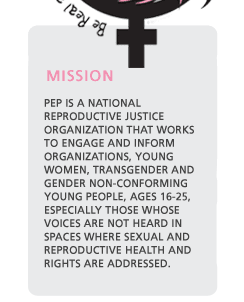What is an �abortion�?
The word �abortion� literally means a pregnancy ending before birth, and it can either be spontaneous or induced.
A spontaneous abortion means that a woman�s body stops her pregnancy because it is not healthy, because of an injury, or sometimes without any reason that a doctor can figure out. These are usually called a miscarriage.
Most of the time �abortion� means an induced abortion, or when a woman ends her pregnancy intentionally for her own reasons.
What kind of woman has an abortion? How common is abortion?
The women who have abortions look just like you and me. Abortion is one of the most common medical procedures practiced in the United States. By the time women reach age 45, almost 1 in 3 have had abortions. That means someone you know has had an abortion, even if you don�t know who, when or why.
Why would someone have an abortion?
Every woman is different, and she may have several reasons for choosing to end her pregnancy. The most common reasons are not being able to afford a child (or another child), relationship problems, and school and work constraints. Just like no two women's experiences are the same, no two women's reasons for ending a pregnancy are exactly the same.
I�ve heard lots of things about what happens during an abortion�are there different kinds of abortion?
THE FOLLOWING DESCRIBES MEDICAL PROCEDURES AND MAY BE GRAPHIC. IF YOU ARE UNCOMFORTABLE, YOU CAN SKIP TO THE NEXT QUESTION BY CLICKING HERE.
There are a lot of myths about abortion, but abortion is a very safe medical procedure. There are two main types of abortion � medication and surgical.
� Medication Abortion is used to safely end a pregnancy within the first seven weeks by taking two drugs. First, you take a drug called Mifiprex to stop your body from producing hormones you need during pregnancy. Then you take another medication called misoprostol to soften your cervix. After the Mifiprex stops your body from producing pregnancy hormones, your pregnancy will end within 1-2 days. The misoprostol will soften your cervix so that the placenta and fetus�which are both still very small�can pass through, and it will look like a heavy period.
You will feel strong cramps after you take the misoprostol that will last until after you have passed all of the tissue from your pregnancy. This can take several hours or a couple of days, but your doctor should give you a prescription for pain medication to help lessen the cramping.
� Surgical Abortion takes about 5-20 minutes, depending on how long you�ve been pregnant. It requires a medical professional to open your cervix (dilation) and remove the placenta and fetus from your uterus. Dilation can be uncomfortable, like menstrual cramps, but your doctor should numb your cervix first to minimize these cramps. After dilation, the doctor will use an instrument to suction out the lining of your uterus. This is called evacuation and is what removes the placenta and fetus from your uterus. Depending on the length of the pregnancy, the doctor* will use either a hand-held syringe or an electronic vacuum to remove the fetus and placenta. Although it sounds unpleasant to use an electronic vacuum inside your uterus, it�s faster and causes less uterine bleeding than a hand-held syringe would when you have been pregnant for longer than 9 weeks.
Depending on how your abortion goes and how long you have been pregnant, the doctor may clean the walls of your uterus to make sure that no tissue is left inside your uterus. This process is called curettage. The longer you have been pregnant, the more tissue your doctor needs to remove, and s/he will want to be sure to remove everything.
I�ve decided to get an abortion�
Do I need permission from an adult before having one?
It depends on where you live. If you are under 18, some states require that your doctor tell your parents before you get an abortion. Others require that you get permission from your parents before getting an abortion. If you really can�t tell your parents about your decision to have an abortion, you will have to get an order from a judge. This is called a judicial bypass and it allows a minor to have an abortion without telling her parents or getting their permission. To find more about out the laws in your state and the judicial bypass, visit NARAL Pro-Choice America.
Where can I go to get an abortion?
There are many resources if you need help finding a doctor to perform your abortion:
� Planned Parenthood Federation of America: call 1-800-230-PLAN or visit www.ppfa.org
� National Abortion Federation: call 1-800-772-9100 (Monday-Friday 8AM � 9PM and Saturdays 9AM � 5PM, Eastern Time) or visit www.prochoice.org
� Abortion Clinics Online: www.gynpages.com
How much does an abortion cost?
The costs for an abortion depend on several factors, including where you live and far along you are into the pregnancy. The average cost of a first-term abortion, when the vast majority of abortions take place, is between $450 and $500. The later into the pregnancy the procedure takes place, the more expensive it becomes.
What if I can�t afford an abortion, what do I do?
The National Network of Abortion Funds (NNAF) is a nationwide coalition of community-based organizations that help women who can�t afford to get an abortion with money, housing and transportation. You can contact the National Network of Abortion Funds for more information.
After my abortion, then what?
You may be experiencing a lot of feelings after your abortion. Below are some resources that might provide some support for you after your abortion.
� Exhale offers a free, confidential post-abortion Talkline; 1-866-4EXHALE (Monday-Friday, 5PM � 10PM Pacific Time; and Saturday and Sunday, 12PM � 10PM Pacific Time)
� Backline offers a free, confidential talkline to talk about pregnancy, parenting, abortion and adoption; 1-888-493-0092 (Monday � Thursday, 5PM � 10PM Pacific Time; and Friday � Sunday, 10AM � 3PM, Pacific Time)
� Our Truths/Nuestras Verdades is a magazine dedicated to de-stigmatizing abortion by creating a safe space for all people to share their experiences with abortion.
� | 





